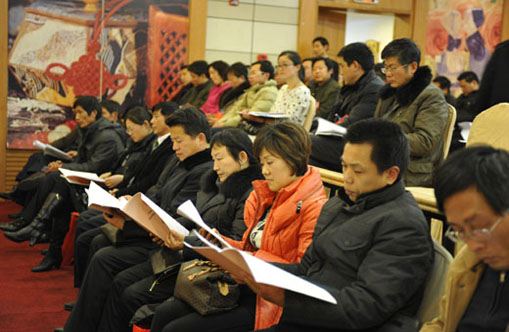Society urges granting more clout for advisors to function

 0 Comment(s)
0 Comment(s) Print
Print E-mail CNTV, March 4, 2015
E-mail CNTV, March 4, 2015
China's political advisors begin their annual session today. The National Committee of the Chinese People’s Political Consultative Conference—or CPPCC-- has over 2,000 members. They come from 8 political parties allied with the Communist Party of China, along with representatives from different fields, and notable figures. As Han Bin reports, more people are calling for reforms to strengthen the organization's role. They also hope the CPPCC members provide more quality proposals that address the public's deepest concerns.
For China, there's no time to stop.
The country is moving ahead with deep reforms for lasting growth.
For the top advisors, the annual meeting is the best chance to make their voices heard.
And the media is here to help get the word out.
"My proposal relates to the complete assessment of the country's natural resources," said Jiang Zehui, CPPCC member.
"I hope the government will speed up making a new law specifically on land pollution," said Zhao Yuanyu, CPPCC member.
"Special funding should go into higher education," said Wang Changhua, CPPCC member.
"My proposal relates to improving China's Soft power," said Zhao Mei, CPPCC member.
The topics are wide-ranging, the ideas are diverse.
The 2000-plus CPPCC members bring their influence to policies.
It's also their duty to supervise the government’s work.
The key part of their job is the proposals through which they offer their expertise.
"Selecting the right topics, conducting surveys and studies, carrying out interactions and exchanges, and applying research results are all prerequisites to implementing CPPCC consultative democracy more effectively....We need to listen attentively to what people have to say," said Yu Zhensheng, chairman of CPPCC National Committee.
Chairman Yu Zhengsheng stressed that almost 100 percent of the nearly 6,000 proposals put forward last year, were dealt with. Many have been adopted in policies.
But not everyone is satisfied. Many members say the departments involved should have taken their proposals more seriously.
Here at the Proposal Division, it’s the busiest time of the year.
The number of proposals has grown over the past year, a sign that more problems are being exposed.
Some will find their way onto the Internet.
Some feedback from the government will be published for public scrutiny this year.
Deputy Director Tian Jie announced all proposals will be sent to the appropriate department by March. Their work is to push forward the processing.
“We usually provide a range of topics for the proposals, including the working priorities of ministries, key strategies of the central government, as well as the priority of the CPPCC's annual work. As these proposals are the priorities of the government, they can be more efficiently dealt with by relevant departments,”Tian said.
Still, many people want more improvement.
Former member Cai Jiming has criticized the overall quality of proposals.
He believes better proposals would make a bigger difference in supervision.
He's also calling for more professional standards among the CPPCC membership.
"Comparatively speaking, the mechanism of political consultation is well played, as there are many effective means to guarantee the normal practice over the past years. However, it’s the responsibility of democratic supervision that has fallen far short of the expectations," said Cai Jiming, former CPPCC member of Institute of Economics, Tsinghua University.






Go to Forum >>0 Comment(s)